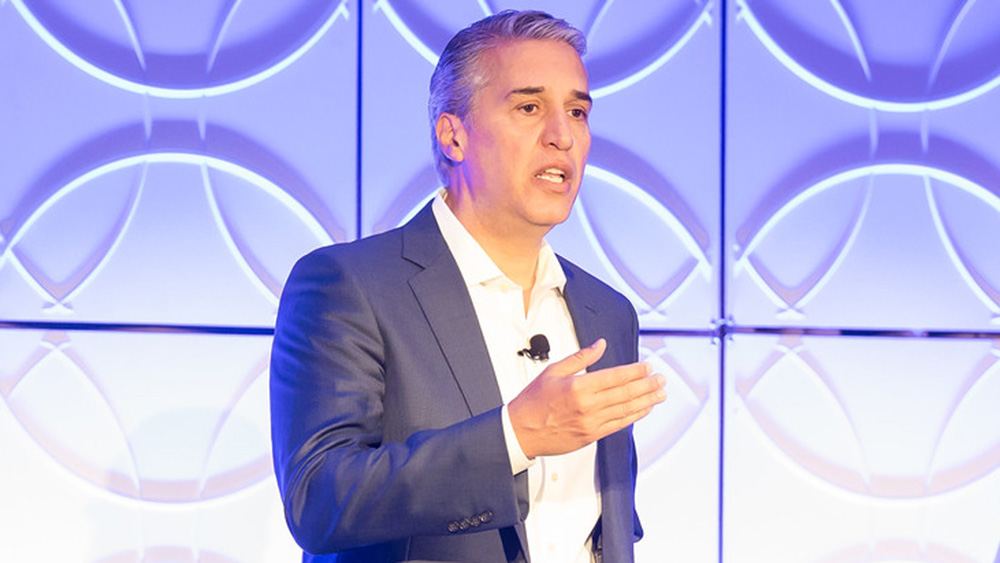
In a presentation at ECEF 2023, Fernando Fischer, president, Americas at Reed Exhibitions, cited four core principles of value-based selling. (Courtesy ECEF)
In his “Return on Expectation: The Better Customer Satisfaction Metric” session at ECEF 2023 on May 31, Fernando Fischer, president, Americas at RX (Reed Exhibitions), focused on the principles of value-based selling, which became crucial during COVID-19.
Fischer started off by sharing the two main questions he often gets asked by newcomers and students: What keeps you awake at night? and What is it you really do?
For that first question, Fischer discussed the challenge of balancing personalization — “how customers are demanding uniqueness in the way we treat them,” he said, and scalability in using the resources they have in order to maximize profitability. “Unfortunately,” he said, “this conversation today is no longer either/or, it’s how you’re going to do [both].”
When he speaks to high-school students and they ask that second question, he said what he does comes down to managing expectations with clients, talent, stakeholders, and himself.
The journey toward value-based selling began for Fischer at a pivotal moment during the pandemic: “I was listening to a Delta Air Lines earnings call and I realized that Delta would not survive without airplanes,” he said. “Events is what we do. That’s our airplane. We will need to go back to events in order to survive, which doesn’t mean that we’ll not push for digital transformation.”
In providing digital events to Reed’s customers, he said he realized very quickly that “proving value was here to stay. The digital transformation really pushed that to us.”
Fischer cited four core principles of value-based selling:
- Avoid rushing to rebooking; focus on deepening insights with clients.
- Engage multiple decision-makers and influencers in companies so that “you really understand what they need and start building a consensus of the next show and the next cycle,” he said, adding in the digital elements that you need to deliver to your customers.
- Understand the needs of customers and tailor solutions accordingly.
- Set prices based on value rather than location and avoid unnecessary discounts.
Fischer discussed how RX implemented value-based selling, dividing it into two pillars: tools and technology, and processes and talents. “We’ve made the decision to own the data,” he said, “from really creating an exhibitor directory. We’re investing in our own registration tool. To me,” Fischer added, “registration is where everything starts and ends.”
The other piece, he said, is really about process. “You start by having the athlete mentality that you really train your team.” Fischer said he has identified seven steps of value sales-readiness, sharing a few of them with the ECEF audience.
One is event value proposition. If you want to create separate ones for exhibitors and attendees, he said, “do it. If you want to break it into more than one segment like we did for one of our health-care shows — we have six or seven different value propositions for those communities — do it, but your sales talent needs to understand what [they are] selling.”
Second, he said, “create a limited inventory of products that are really unique — solution-based to offer to a limited number of clients.” And the third point is creating a needs-based package solution to clients and allocating your sales team accordingly.
In terms of hiring salespeople, one change RX has made is moving away from seeking out individuals with an events background and focusing more on their ability to sell value. RX is now hiring more sales team members than they need, he said, because they expect some will leave. The company also has moved from one-on-one interviews with sales candidates to group decisions (three or four people now conduct the final interview), and has increased the base pay and uncapped the commission for the sales role.
On the exhibitor side, RX has created an exhibitor dashboard to measure how much they invest in four different solutions: lead generation, brand awareness, product launch, and thought leadership. “We need to be able to prove to them through data how they have performed during the shows and after the show,” Fischer said — and how they compare with other exhibitors.
Using this value-selling approach, Fischer said, has increased the net promoter score for 140 clients by 20 points — “it is working.”
Michelle Russell is editor in chief of Convene.
